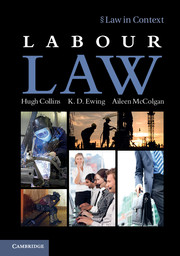Book contents
- Frontmatter
- Contents
- Preface
- Acknowledgments
- Table of cases
- Table of statutes
- Table of statutory instruments
- Table of European Union instruments
- Table of ILO instruments
- Table of other international instruments
- Abbreviations
- Part I Introduction
- Part II The contract of employment
- 3 Terms of the contract of employment
- 4 Authority and co-operation
- 5 Flexibility and precarious work
- 6 The personal scope of labour law
- Part III Statutory regulation of the employment relationship
- Part IV Collective labour rights
- Part V Termination of employment
- Index
- References
4 - Authority and co-operation
from Part II - The contract of employment
- Frontmatter
- Contents
- Preface
- Acknowledgments
- Table of cases
- Table of statutes
- Table of statutory instruments
- Table of European Union instruments
- Table of ILO instruments
- Table of other international instruments
- Abbreviations
- Part I Introduction
- Part II The contract of employment
- 3 Terms of the contract of employment
- 4 Authority and co-operation
- 5 Flexibility and precarious work
- 6 The personal scope of labour law
- Part III Statutory regulation of the employment relationship
- Part IV Collective labour rights
- Part V Termination of employment
- Index
- References
Summary
The legal construction of hierarchy
The legal model of the employment relation presents a structure of authority. From the contract of employment, the employer obtains the legal authority to direct work and the employee assumes an implied obligation to obey lawful orders. In the words of Kahn-Freund, the contract of employment creates a condition of ‘subordination’.
But the relation between an employer and an isolated employee or worker is typically a relation between a bearer of power and one who is not a bearer of power. In its inception it is an act of submission, in its operation it is a condition of subordination, however much the submission and the subordination may be concealed by that indispensable figment of the legal mind known as the ‘contract of employment’. The main object of labour law has always been, and we venture to say will always be, to be a countervailing force to counteract the inequality of bargaining power which is inherent and must be inherent in the employment relationship. Most of what we call protective legislation – legislation on the employment of women, children and young persons, on safety in mines, factories and offices, on payment of wages in cash, on guarantee payments, on race and sex discrimination, on unfair dismissal, and indeed most labour legislation altogether – must be seen in this context. It is an attempt to infuse law into a relation of command and subordination.
- Type
- Chapter
- Information
- Labour Law , pp. 131 - 157Publisher: Cambridge University PressPrint publication year: 2012



